
Could form post-election coalition with Al Maliki's group if neither wins enough seats to form government Image Credit: Supplied
Baghdad: Iraq's fiercely anti-American cleric Moqtada Al Sadr Sunday called on his followers to suspend attacks against US troops to ensure they leave Iraq by a year-end deadline.
But the Shi'ite cleric, whose Mehdi Army militia fought US forces until 2008, warned that if they did not depart on time, military operations would resume and be "very severe".
"Because of my eagerness to accomplish the independence of Iraq and have the invader forces withdraw from our holy land, it has become imperative for me to stop military operations... until the invader forces complete their withdrawal," Al Sadr said in a statement read out by his spokesman Salah Al Ubaidi.
"If not, the military operation will start again and with new approaches, and it will be very severe."
American troops are scheduled to withdraw fully by December 31, more than eight years after the 2003 invasion, but Iraq's leaders are currently negotiating with the United States on whether to retain US military trainers beyond 2011.
Security agreement
Al Sadr warned last month that US military trainers who stayed in Iraq after the end of the year would be targets. About 43,000 remaining troops are due to leave Iraq under a security agreement between the two countries.
While Al Sadr's Mehdi Army has for the most part been demobilised, US officials say splinter groups have continued to attack US soldiers.
"We shall soon see whether the Promised Day Brigade and others affiliated with Al Sadr's organisation continue to conduct attacks against US forces and the Iraqi government, or if these are just words without the deeds to back them up," US military spokesman Colonel Barry Johnson said in an emailed response to Al Sadr's statement.
Although violence in Iraq has dropped dramatically from the height of sectarian fighting in 2006-7, bombings and killings occur daily and Sunni insurgents and Shiite militia are still capable of carrying out lethal operations.











